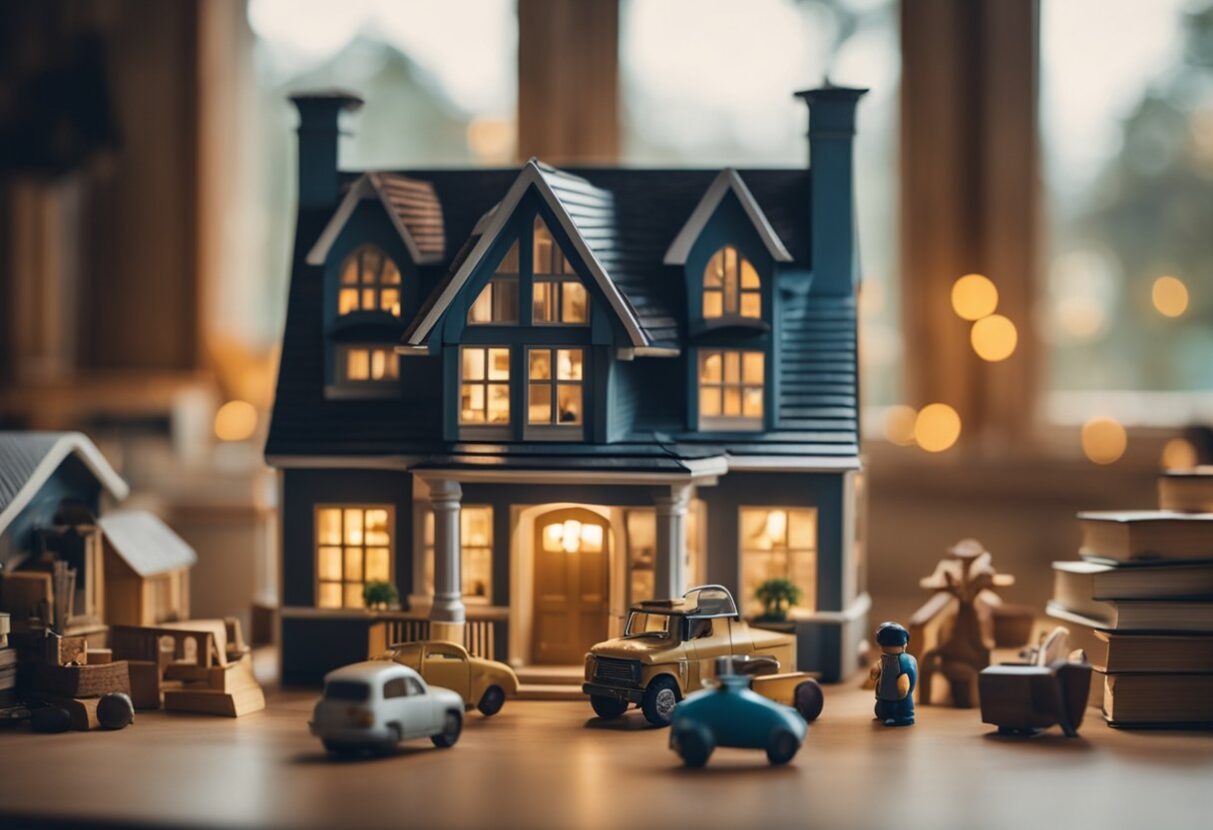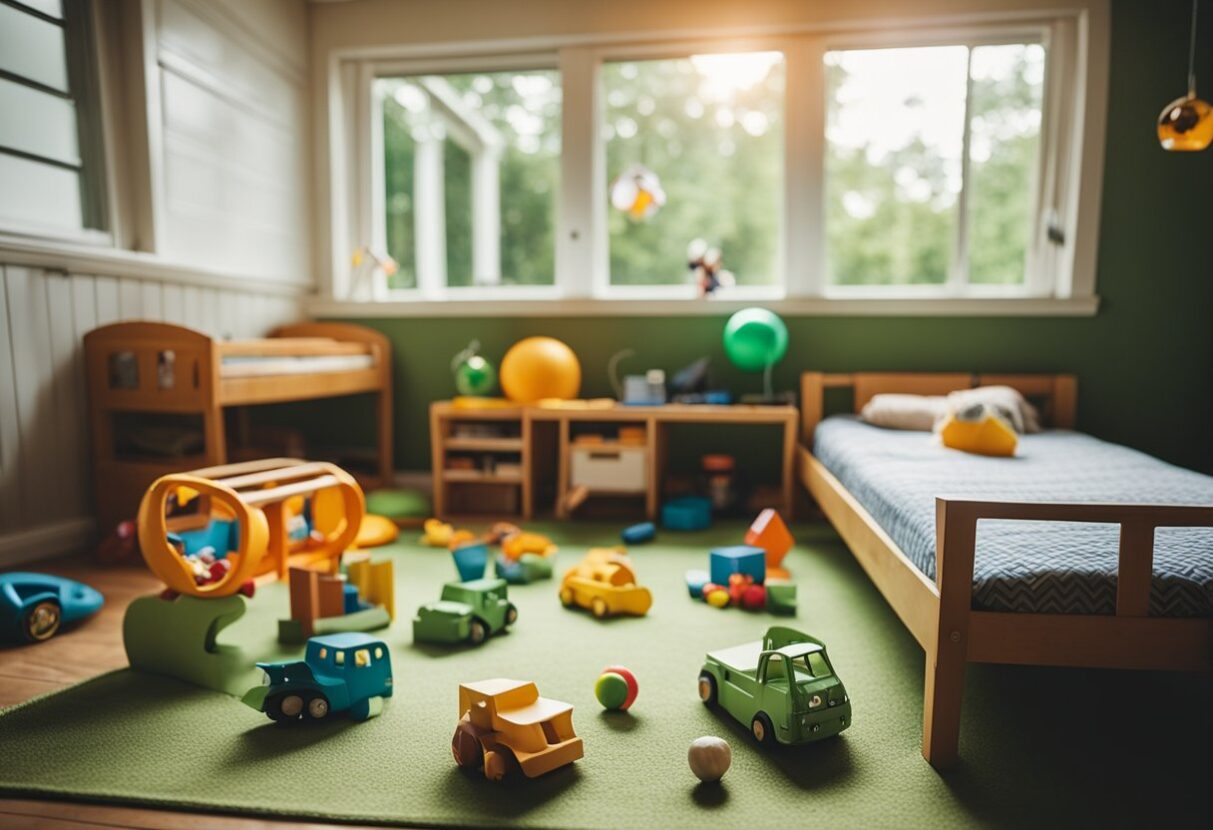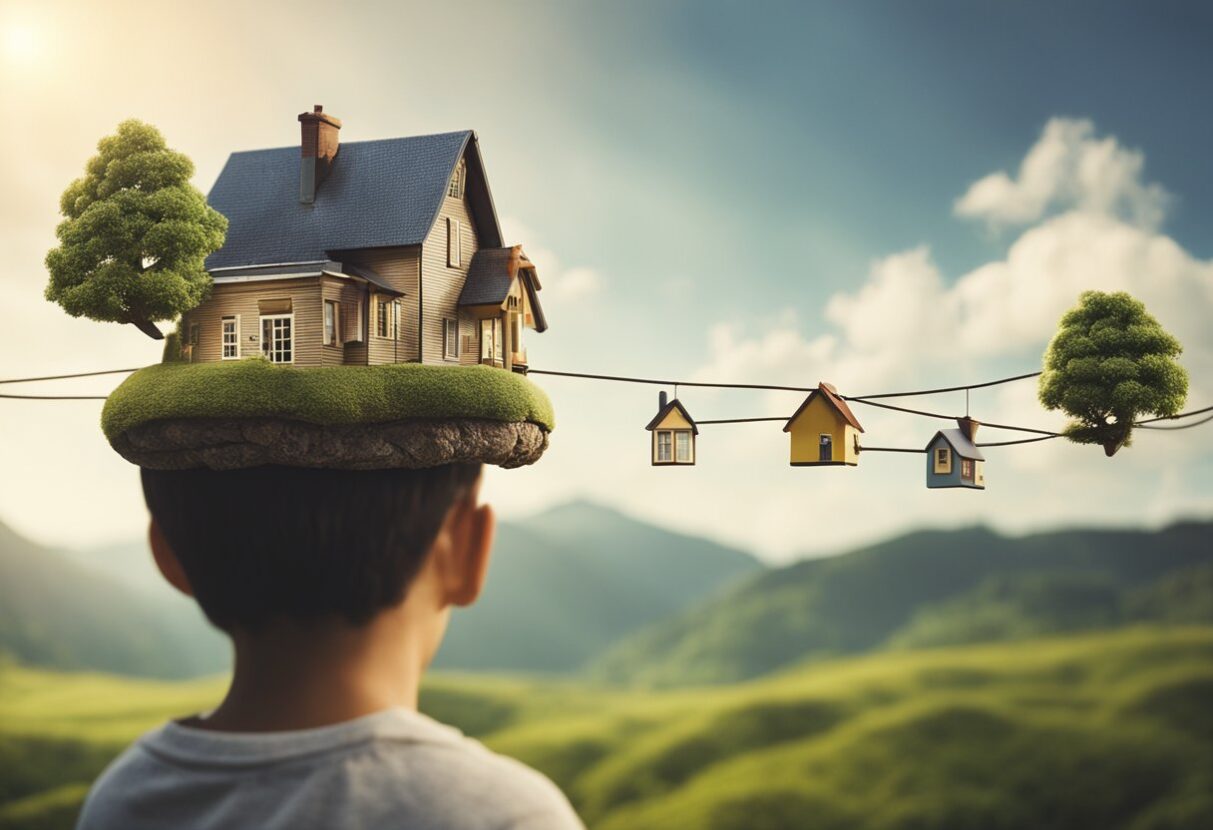Dreaming About My Childhood Home: Meanings And Interpretations
Understanding Dreams of Childhood Homes
Dreams of childhood homes are a common occurrence. They can be both comforting and unsettling, evoking memories of the past and emotions that may have been buried deep in your subconscious. Dream interpretation is a complex field, but understanding the meaning of dreams about childhood homes can provide insight into your subconscious mind and the emotions that you are currently experiencing.
Dreams are a way for your subconscious to communicate with you. They are a reflection of your thoughts, feelings, and experiences, and can provide insight into your mental and emotional state. Dreams of childhood homes are particularly significant because they are linked to memories of your past, and can represent feelings of nostalgia, comfort, or even trauma.
Interpretations of dreams of childhood homes vary, but they often indicate a desire to revisit the past or to reconnect with aspects of your childhood. For example, dreaming about your childhood bedroom may indicate a desire for security or a need to feel safe and protected. Alternatively, dreaming about your childhood home may represent a longing for simpler times or a desire to reconnect with people or experiences that made you feel happy and carefree.
Dreams of childhood homes can also represent unresolved emotions or experiences from your past. For example, if you experienced trauma or difficult experiences as a child, dreaming about your childhood home may be a way for your subconscious to process and work through those experiences.
In psychology, dreams are often seen as a way for the mind to process and integrate memories and emotions. Dreams of childhood homes can be a way for your mind to revisit and work through memories and emotions that may have been buried deep in your subconscious. By understanding the meaning of these dreams, you can gain insight into your subconscious mind and the emotions that you may be experiencing in your waking life.
Emotional Significance of Childhood Home Dreams
Dreams about childhood homes are incredibly common and often carry a deep emotional significance. They can be a source of comfort and nostalgia, or they can be a reflection of stress, anxiety, trauma, and healing. Understanding the different emotional meanings of childhood home dreams can help you gain insight into your subconscious mind and your emotional needs.
Nostalgia and Comfort
Dreaming about your childhood home can evoke feelings of nostalgia and comfort. It can be a way to reconnect with happy memories from your past and to feel a sense of safety and security. Childhood homes are often associated with a sense of belonging and familiarity, and dreaming about them can provide a sense of grounding and stability.
Stress and Anxiety
On the other hand, dreaming about your childhood home can also be a reflection of stress and anxiety. It can be a sign that you are feeling overwhelmed by current life circumstances and are seeking comfort and security. Childhood homes can also represent unfinished business or unresolved issues from your past that are causing you stress in your present.
Trauma and Healing
Dreaming about your childhood home can also be a sign of trauma and healing. Childhood homes can be associated with both positive and negative memories, and dreaming about them can be a way to process and heal from past traumas. Dreams about childhood homes can also be a sign that you are ready to confront and address unresolved issues from your past in order to move forward and heal.
In conclusion, childhood home dreams can carry a range of emotional meanings and can provide valuable insight into your subconscious mind and emotional needs. By exploring the different emotional associations of childhood home dreams, you can gain a deeper understanding of yourself and your emotional needs.
Symbolism in Childhood Home Dreams

Dreaming of your childhood home can be a powerful and emotional experience. The symbolism behind these dreams can provide insight into your subconscious mind and help you to understand your past, present, and future.
House as a Symbol of Self
In dreams, a house often represents the self. The different rooms and areas of the house can represent different aspects of your personality and life. For example, the kitchen may represent nourishment and nurturing, while the living room may represent social interaction and relaxation.
Dreaming of your childhood home can indicate that you are reconnecting with your past and exploring your roots. It may also suggest that you are seeking comfort and security, particularly during times of stress or uncertainty.
Rooms and Their Meanings
Each room in your childhood home may hold a different meaning in your dreams. For example, the bedroom may represent your innermost thoughts and desires, while the bathroom may represent your need for cleansing and renewal.
The attic may represent your subconscious mind or hidden memories, while the garden may represent your connection to nature and the outdoors. Exploring the different rooms of your childhood home in your dreams can provide insight into your innermost thoughts and emotions.
Objects and Their Representations
Objects within your childhood home can also hold symbolic meaning in your dreams. For example, a family photo may represent your desire for connection and belonging, while a childhood toy may represent your desire for playfulness and freedom.
Exploring the different objects within your childhood home in your dreams can help you to understand your subconscious desires and needs.
In conclusion, dreaming of your childhood home can be a powerful and emotional experience. The symbolism behind these dreams can provide insight into your subconscious mind and help you to understand your past, present, and future. By exploring the different rooms, objects, and areas of your childhood home in your dreams, you can gain a deeper understanding of yourself and your innermost thoughts and emotions.
Interpreting Common Childhood Home Dream Scenarios

Dreams of childhood homes can hold a variety of meanings. Here are some common scenarios that people experience and their possible interpretations.
Childhood Home Being Destroyed
If you dream of your childhood home being destroyed, it may indicate that you are going through a period of intense change and transformation. The destruction of your childhood home represents the destruction of old patterns, beliefs, and ways of being that no longer serve you. This dream may be a sign that you are ready to let go of the past and embrace new opportunities for growth and positive changes in your life.
Childhood Home Floating on Water
If you dream of your childhood home floating on water, it may indicate that you are experiencing a period of emotional cleansing. Water is often associated with emotions, and the floating home may represent your childhood memories and emotions that are resurfacing. This dream may be a sign that you are ready to release old emotional baggage and move forward with a renewed sense of clarity and purpose.
Renovation and Transformation
If you dream of your childhood home undergoing renovation or transformation, it may indicate that you are ready for a fresh start. The renovation or transformation of your childhood home represents the potential for positive changes and new beginnings in your life. This dream may be a sign that you are ready to take action towards your goals and create a new future for yourself.
In summary, dreaming of your childhood home can be a powerful symbol of change, transformation, and growth. By paying attention to the specific details of your dream, you can gain insight into your subconscious mind and use this information to make positive changes in your waking life.
Navigating Personal Growth and Change

Dreaming about your childhood home can be a powerful symbol of transformation and personal growth. As you move through different phases of your life, your dreams may reflect your changing relationship with your past, present, and future. In this section, we will explore some of the ways that dreaming of your childhood home can help you navigate personal growth and change.
Moving On and Letting Go
One common interpretation of dreaming about your childhood home is that it represents a turning point in your life. Perhaps you are ready to move on from old patterns of behavior or relationships that no longer serve you. Your dream may be urging you to let go of the past and embrace new opportunities for growth and self-improvement.
Embracing New Relationships and Phases
Another way to interpret dreaming about your childhood home is that it represents a sense of nostalgia for a simpler time in your life. However, this does not necessarily mean that you want to go back to the past. Instead, your dream may be encouraging you to embrace new relationships and phases in your life with the same sense of wonder and curiosity that you had as a child.
As you navigate personal growth and change, it is important to remember that your dreams are a reflection of your innermost desires and fears. By paying attention to your dreams, you can gain valuable insights into your subconscious mind and the obstacles that may be holding you back from fulfilling your true potential. Whether you are moving on from old relationships, embracing new opportunities, or simply seeking a deeper sense of self-awareness, dreaming about your childhood home can be a powerful tool for transformation and growth.
Connecting Dreams to Current Life Circumstances

Dreams about childhood homes can offer insights into your current life circumstances. They can be a reflection of your relationships, family dynamics, career and personal aspirations, health and lifestyle choices, and environment. In this section, we will explore how your dreams of childhood homes can help you connect with your current situation.
Relationships and Family Dynamics
Your childhood home is where you grew up and formed your first relationships with your family members. Dreaming about your childhood home can signify a desire to reconnect with your family or a specific family member. It can also indicate unresolved issues or conflicts that need to be addressed. For example, if you dream about your childhood home being destroyed, it could represent a fear of losing your family or the relationships you have built.
Career and Personal Aspirations
Dreams about childhood homes can also be linked to your career and personal aspirations. They can represent opportunities or limitations that you are facing in your current life. For instance, if you dream about your childhood home being renovated or expanded, it could symbolize your desire for personal growth and advancement in your career. On the other hand, if you dream about your childhood home being small and cramped, it could represent limiting beliefs that are holding you back from achieving your goals.
Health and Lifestyle Choices
Dreams about childhood homes can also be related to your health and lifestyle choices. They can indicate a need to confront unhealthy behaviours or habits that are hindering your well-being. For example, if you dream about your childhood home being cluttered and messy, it could represent a need to declutter your life and make healthier choices. Alternatively, if you dream about your childhood home being clean and organised, it could signify a desire to maintain a healthy and balanced lifestyle.
In conclusion, your dreams about childhood homes can be a powerful tool for self-reflection and personal growth. By exploring the different aspects of your current life circumstances, you can gain a deeper understanding of your dreams and use them to make positive changes in your life.
Actionable Insights from Dream Analysis
Dreaming of your childhood home can offer valuable insights into your life. By analyzing your dreams, you can identify limiting beliefs, explore opportunities for growth, and seek professional guidance. Here are some actionable insights from dream analysis:
Identifying Limiting Beliefs and Triggers
Your dreams can reveal limiting beliefs and triggers that are holding you back. For example, if you dream of being stuck in your childhood home, it may indicate that you feel trapped in your current situation. By identifying these limiting beliefs and triggers, you can take steps to overcome them and move forward.
Exploring Opportunities for Growth
Your dreams can also reveal opportunities for growth. For example, if you dream of renovating your childhood home, it may indicate that you are ready for a new chapter in your life. By exploring these opportunities for growth, you can take steps to achieve your goals and live your best life.
Seeking Professional Guidance
If your dreams are causing you distress or impacting your daily life, it may be helpful to seek professional guidance. A therapist or dream analyst can help you interpret your dreams and provide guidance on how to use them to improve your life.
Remember, dream interpretation is a personal process. What your dreams mean to you may be different from what they mean to someone else. By paying attention to your dreams and exploring their meanings, you can gain a deeper understanding of your inner self and take steps towards a more fulfilling life.
Cultural and Mythological Perspectives
When it comes to interpreting dreams about childhood homes, cultural and mythological perspectives can provide valuable insight into the symbolism and meaning behind these dreams. In this section, we will explore archetypal themes in dreams and cultural interpretations of home.
Archetypal Themes in Dreams
Dreams about childhood homes can be seen as a reflection of deeper archetypal themes that are present in the human psyche. For example, the home is often associated with safety, security, and comfort, and dreaming of a childhood home can represent a desire to return to a state of innocence and protection. Additionally, the childhood home can be seen as a representation of the mother, as it is often the mother who is responsible for creating a safe and nurturing environment for the child.
Cultural Interpretations of Home
Different cultures have their own unique interpretations of the symbolism of the home. For example, in Chinese culture, the home is seen as a representation of the self, and dreaming of a childhood home can be interpreted as a desire to reconnect with one’s true self. In Hinduism, the home is seen as a sacred space, and dreaming of a childhood home can be interpreted as a sign of spiritual growth and transformation.
In addition to cultural interpretations, there are also mythological interpretations of the symbolism of the home. In Greek mythology, the goddess Hestia was the goddess of the hearth and home, and was responsible for maintaining the sacred fire that represented the home’s warmth and security. Dreaming of a childhood home can be seen as a connection to this ancient mythological archetype.
Overall, cultural and mythological perspectives can provide valuable insight into the symbolism and meaning behind dreams about childhood homes. By exploring these interpretations, you can gain a deeper understanding of the archetypal themes and cultural significance of the home in the human psyche.
Practical Tips for Dream Recall and Journaling
Dreams are a fascinating window into the subconscious mind, often revealing hidden emotions, memories, and desires. If you have been dreaming about your childhood home, you may be experiencing nostalgia or revisiting unresolved issues from your past. To better understand the meaning behind your dreams, it is essential to improve your dream recall and journaling skills. Here are some practical tips to help you get started:
1. Create a Dream Journal
Keeping a dream journal is the first step in improving your dream recall. A dream journal is a place where you can record your dreams as soon as you wake up. It can be a physical notebook or a digital app. The important thing is to use it consistently. When you wake up, write down everything you remember about your dream, including the people, places, and emotions you experienced.
2. Use Recall Techniques
To improve your dream recall, you can use various recall techniques. Before going to bed, tell yourself that you want to remember your dreams. When you wake up, try to stay still and keep your eyes closed for a few minutes, focusing on your dream. Then, try to recall as much detail as possible and write it down in your dream journal.
3. Analyze Your Dreams
After recording your dreams in your journal, take some time to analyze them. Look for patterns or recurring themes. Try to identify the emotions and memories that are associated with your dreams. If you are having trouble interpreting your dreams, there are many resources available, such as dream dictionaries or professional dream analysts.
4. Practice Consistently
Improving your dream recall and journaling skills takes time and practice. Make it a habit to record your dreams every morning, even if you don’t remember much. The more you practice, the more you will improve your dream recall and begin to understand the meaning behind your dreams.
By following these practical tips, you can enhance your dream recall and journaling skills and gain a deeper understanding of your subconscious mind. Remember to be patient and consistent, and don’t be afraid to seek help if you need it.
Exploring the Unconscious Mind
Dreams about childhood homes can often be a manifestation of the subconscious mind. During sleep, the mind processes emotions, memories, and experiences from the day. Childhood homes are often associated with feelings of safety, comfort, and security. As a result, dreaming of a childhood home can indicate a desire to return to a simpler time or to reconnect with one’s roots.
Shadow Self and Hidden Desires
Dreams about childhood homes can also reveal aspects of the shadow self and hidden desires. The shadow self is the part of the psyche that contains repressed emotions, desires, and impulses. It is the part of the self that is often hidden from conscious awareness. Dreaming of a childhood home can be a way for the shadow self to communicate with the conscious mind. It can reveal desires or emotions that have been repressed or ignored.
For example, dreaming of a childhood home may indicate a desire for security or stability. It may also reveal unresolved issues from childhood that need to be addressed. By exploring the symbolism of the dream, one can gain insight into the hidden desires and emotions that are influencing their behaviour.
Connecting with the Higher Self
Dreams about childhood homes can also be a way to connect with the higher self. The higher self is the spiritual aspect of the self that is connected to the divine. It is the part of the self that is beyond the ego and the conscious mind. Dreaming of a childhood home can be a way for the higher self to communicate with the conscious mind. It can reveal spiritual insights or guidance that can help one on their spiritual journey.
For example, dreaming of a childhood home may indicate a need to reconnect with one’s spiritual roots. It may also reveal spiritual insights that can help one to overcome obstacles or challenges in their life. By exploring the symbolism of the dream, one can gain insight into the spiritual guidance that is available to them.
Dreaming of a childhood home can also be a way to connect with deceased relatives. It is believed that the deceased can communicate with the living through dreams. Dreaming of a childhood home may indicate that a deceased relative is trying to communicate with you. By exploring the symbolism of the dream, one can gain insight into the message that the deceased relative is trying to convey.
In summary, dreams about childhood homes can reveal insights into the subconscious mind, the shadow self, hidden desires, and the higher self. By exploring the symbolism of the dream, one can gain insight into the emotions, desires, and spiritual guidance that are influencing their behaviour.
Special Cases and Rare Dream Motifs
Dreams about childhood homes can vary widely in meaning and interpretation. While most dreams about childhood homes are positive and nostalgic, some can be filled with supernatural elements and recurring patterns. In this section, we will explore some of the special cases and rare dream motifs that may occur when dreaming about childhood homes.
Supernatural Elements in Dreams
Dreams about childhood homes can sometimes include supernatural elements, such as ghosts or other paranormal activity. These dreams can be unsettling and confusing, leaving you with a feeling of unease. According to dream interpretation experts, these supernatural elements may represent unresolved issues or emotions from your past that you have not yet dealt with.
For example, if you dream of a ghost in your childhood home, it may represent a feeling of being haunted by past traumas or unresolved issues. Alternatively, it may represent a part of yourself that you have repressed or ignored, and that is now coming back to haunt you.
Recurring Dream Patterns
Recurring dreams are a common occurrence for many people, and dreams about childhood homes are no exception. These dreams can be frustrating and confusing, leaving you wondering why you keep having the same dream over and over again.
According to dream interpretation experts, recurring dreams about childhood homes may represent a desire to return to a simpler time in your life, or a need to resolve unfinished business from your past. Alternatively, they may represent a fear of change or a reluctance to move forward in life.
To break the cycle of recurring dreams, it may be helpful to explore the underlying emotions and issues that are causing the dreams. Talking to a therapist or keeping a dream journal may also be helpful in understanding and interpreting recurring dreams.
In conclusion, dreams about childhood homes can be rich in symbolism and meaning. By exploring the supernatural elements and recurring patterns that may occur in these dreams, we can gain a deeper understanding of ourselves and our past. Whether you are experiencing a one-time dream or a recurring dream pattern, it is important to pay attention to the emotions and messages that your dreams are trying to convey.
Nutrition and Its Impact on Dreaming
Dreaming is a complex process that can be influenced by many factors, including nutrition. Eating a balanced meal that provides nourishment can improve dream quality, while consuming certain foods can affect dream intensity.
Balanced Meals and Dream Quality
Eating a balanced meal that includes a variety of nutrients can improve the quality of your dreams. A diet that lacks essential vitamins and minerals can lead to poor sleep quality and affect your ability to dream vividly.
For example, consuming foods rich in vitamin B6, such as bananas and chickpeas, can increase dream recall and vividness. Additionally, consuming foods that contain tryptophan, such as turkey and milk, can improve sleep quality and promote deeper, more restful sleep, which can lead to more vivid dreams.
Foods That Affect Dream Intensity
Certain foods can affect the intensity of your dreams. For example, consuming spicy or greasy foods before bed can lead to more vivid and intense dreams. On the other hand, consuming alcohol or caffeine can disrupt sleep and affect dream quality.
It’s important to note that everyone’s body is different, and what works for one person may not work for another. Keeping a food diary and tracking your dreams can help you identify which foods affect your dreams and how.
In conclusion, nutrition plays a crucial role in dreaming. Eating a balanced meal that provides nourishment can improve dream quality, while consuming certain foods can affect dream intensity. By paying attention to what you eat and how it affects your dreams, you can improve your dream experience and gain a deeper understanding of yourself.
Dreams as a Bridge to the Past
Dreams can be a powerful tool for accessing memories of the past. When you dream of your childhood home, it can be a way to revisit old memories and reconnect with your roots. The memories that come up in these dreams can be both positive and negative, but they all serve a purpose in helping you understand your past.
Dreams of your childhood home can bring up memories of past experiences, old friends, and family members. You may dream of playing in the backyard, cooking in the kitchen with your parents, or spending time with siblings. These memories can be a source of comfort and nostalgia, reminding you of happy times from your childhood.
On the other hand, dreams of your childhood home can also bring up memories of past traumas or negative experiences. You may dream of arguments with family members, feelings of loneliness or isolation, or other difficult experiences from your past. While these memories can be painful, they can also help you process and work through past traumas.
Dreams of your childhood home can also be a way to reconnect with your roots and gain a deeper understanding of your identity. You may dream of your childhood cottage in the countryside, your grandparents’ house in the city, or other places that hold special meaning for you. These dreams can help you connect with your cultural and familial heritage, and gain a deeper appreciation for where you come from.
In conclusion, dreams of your childhood home can be a powerful tool for accessing memories of the past, both positive and negative. They can help you process past traumas, reconnect with your roots, and gain a deeper understanding of your identity. By paying attention to these dreams and reflecting on the memories they bring up, you can gain valuable insights into your past and present.





